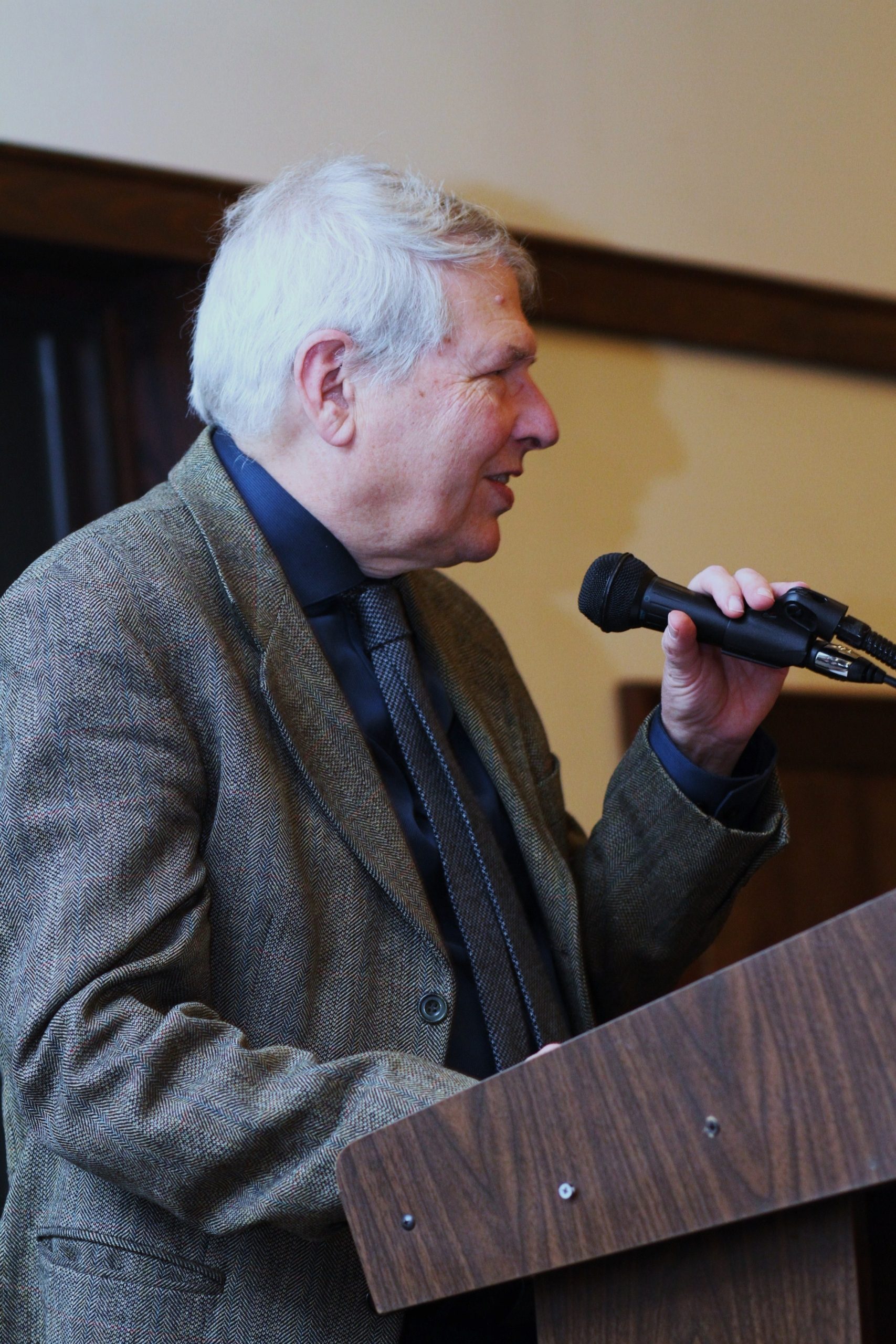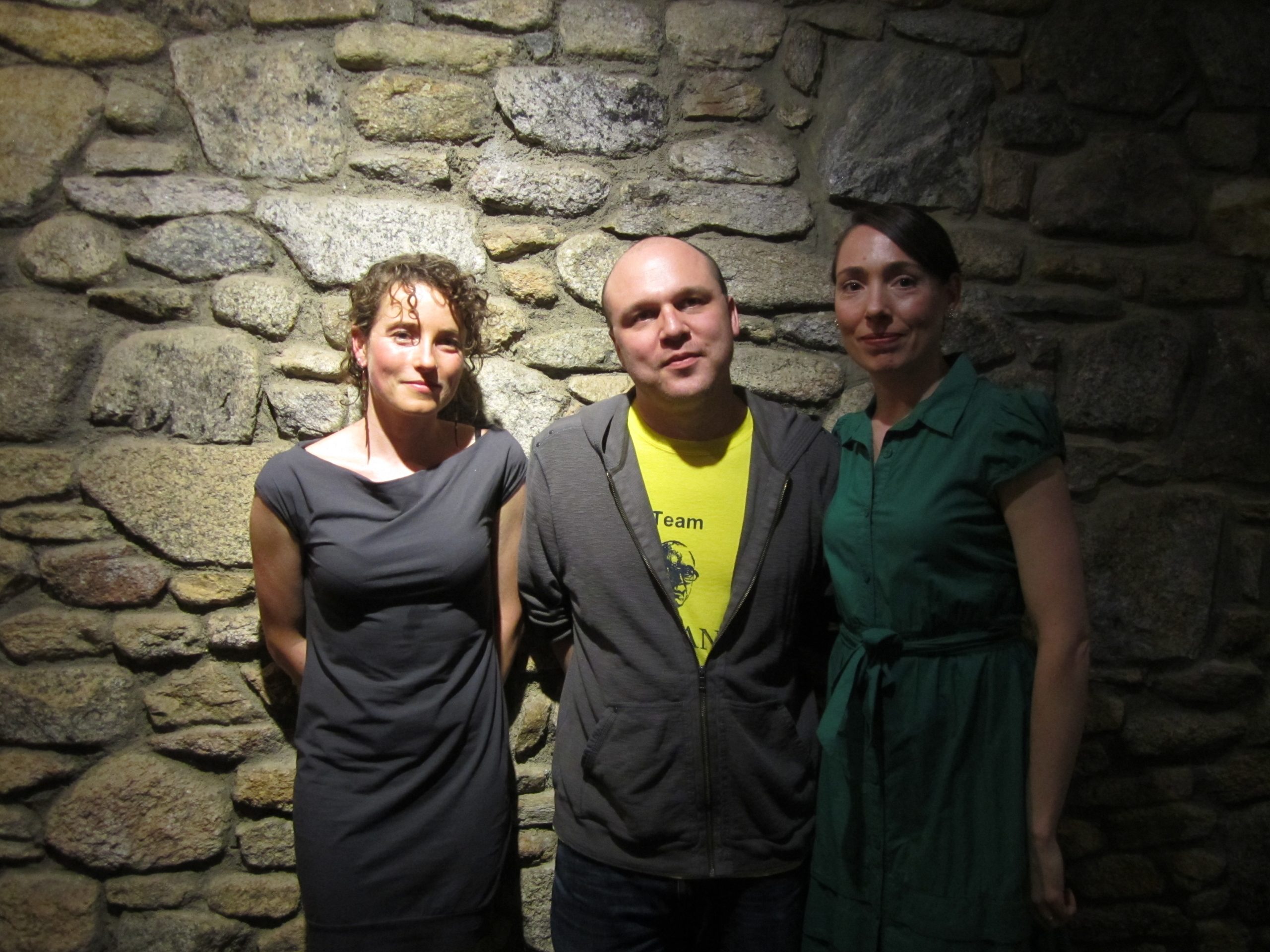
Alan Williamson at the January 2014 Graduation
photo credit: Alissa Whelan
Faculty member Alan Williamson’s January 2014 MFA Graduation Address:
I’ve always liked graduations, except perhaps for the three or four hour ones, processing hundreds of students in every imaginable field, at the State University where I’ve had my other job. They seem one of the summit moments in life, where one breathes an exhilaratingly thin air and can look hundreds of miles in all directions. Behind lies an arduous climb, a history of accomplishment and, often, of sacrifice, and of the sacrifices, patience and warm support of all of the families and loved ones who are here today. Ahead lies a horizon that can seem as limitless as one’s hopes.
But, of course, unless we’re very, very lucky, the future won’t be that easy. At these Warren Wilson graduations, we used to sing a quite lovely song including the words “The great storm is over.” But, some years back, a student who’d been something of a star in the program wrote me, a few months after she graduated, that what graduates needed to be told was that the great storm had just begun. Now you will need to make time for your work, in the midst of all the stresses and claims of everyday life, without deadlines to make sure you get it done. You will no longer be able to look forward to being, at least every six months, in a community of extraordinarily gifted, and equal committed, fellow strivers. Rather than sending your work to sympathetic teachers, you will send it into the hard and unforgiving world of editors and agents, a world that is often “worldly” in all the bad senses.
In the hard times in our lives as writers, which will come to all of us, what we have to fall back on—the only thing, perhaps—is our sense that the work is worth doing for its own sake; that it is an end, not a means. I’ve sometimes been asked to justify teaching creative writing at all—not, obviously, here at Warren Wilson, but in the undergraduate context, where few of the students will go on to consider themselves serious writers. My best answer is that attempting to write—as perhaps, to practice any art—gives us a different way of knowing ourselves and our world. Like meditation, it is a way of slowing down in order to pay greater attention to life. And, like meditation, it can lead us to be more disinterested, to question the stories we normally tell ourselves about our lives, based on our desires and fears, our need for self-justification. It is a mode of what my friend Jon Kabat-Zinn calls “mindfulness.”
Perhaps what comes into focus is some object of the natural world—the flecks in a stone, a spiderweb, a pattern of leaves—standing out, as if suddenly placed under a microscope. Perhaps it’s a bit of our past, brought back by the coincidence of a kind of weather, a smell, or a taste, like Proust’s madeleine. Or our attention turns to our inner life, trying, in Wallace Stevens’s words, to find the “adjective” for a “sadness without cause.” Perhaps, if you’re a fiction writer, you notice the emotional undercurrents, what is communicated without being said, in the conversations around you. Or you go further, and see the pattern of a whole destiny revealed in a minor habit, a particularly puzzling choice.
All such revelations are liberating, I think, even when they’re never successfully gotten down into words. Since I’m a poet, let me take my text from fiction. Alice Munro’s story “The Meneseteung” concerns Almeda Roth, the forgotten, utterly conventional spinster “poetess” of a small town in Ontario in the 1870’s. One day, Almeda suffers a minor trauma. She hears a fight during the night among the lower-class people who inhabit the street behind her house. In the morning she finds a woman she thinks has been murdered, almost at her back door. However, her helpful neighbor, the businessman Jarvis Poulter, realizes the woman is only dead drunk, and rouses her with a nudge of his foot. Almeda is sick from shock all the next day, and takes “nerve medicine” (laudanum). In her semi-trance, she has the vision of
one very great poem that will contain everything and, oh, that will make all the other poems,the poems she has written, inconsequential, mere trial and error, mere rags? Stars and flowers and birds and trees and angels in the snow and dead children at twilight—that is not the half of it. You have to get in the obscene racket on Pearl Street and the polished toe of Jarvis Poulter’s boot…. All this can be borne only if it is channeled into a poem, and the word “channeled” is appropriate, because the name of the poem will be—it is—“The Meneseteung.” The name of the poem is the name of the river. No, in fact, it is the river, the Meneseteung, that is the poem—with its deep holes and rapids and blissful pools under the summer trees and its grinding blocks of ice thrown up at the end of winter and its desolating spring floods.
Almeda has, essentially, invented the Modernist long poem, fifty years before its time. That she will never be able to write it is, Munro makes us feel, beside the point. Because she has been capable of conceiving it, this poem that is the equivalent of her entire life, that life has not been wasted, even when she is an elderly eccentric tormented by the “urchins” of Pearl Street. As Virginia Woolf writes of Lily Briscoe, she has “had her vision.”
“Ariel was glad he had written his poems,” Wallace Stevens wrote toward the end of his life.
It was not important that they survive.
What mattered was that they should bear
Some lineament or character,
Some affluence, if only half-perceived,
In the poverty of their words,
Of the planet of which they were part.
My hope is that we will all, in the end, be glad we have written our poems or stories, however much or little fame they bring us. They have allowed us, in a sense, to live our lives twice, once in the confusion of our everyday blindness, once in a clarity that might be the point of view of Eternity. If even Wallace Stevens sometimes felt a “poverty,” an inadequacy, in his own words, which of us would dare not to feel that, on occasion? But what mattered was that life came to seem an abundance, an “affluence,” even “if only half-perceived,” in the struggle to put it down in those words.




